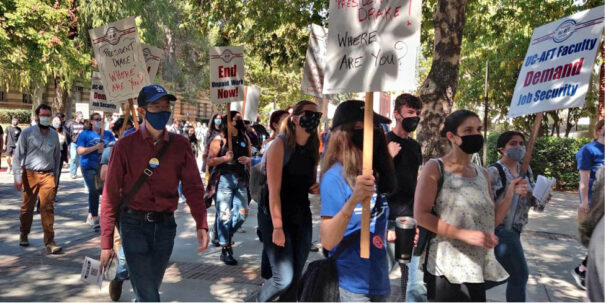
SANTA BARBARA, Calif.—A university system-declared impasse after two years of bargaining may force some 6,300 teaching, non-tenured faculty, plus 500 librarians, at the University of California system to strike.
Though yet another bargaining session is scheduled for Nov. 10—and is open to the public and supporters via Zoom starting at 2 pm Pacific Time—the two sides are now in state-mandated document exchanges and potential mediation, the teachers’ union, University Council-AFT, says.
It also views the mediation as a management technique to continue to stall.
Key issues when talks began on Jan. 30, 2019, were diversity, or lack of it, low pay, and lack of tenure. The median pay for the non-tenured faculty, who do almost all of the teaching in the UC system, is $19,667 yearly, meaning half are below that figure and half above.
“It’s no surprise the majority of Black, Indigenous, Latinx, Asian American, and Pacific Islander faculty are in this lower-paid category than in any other,” UC-AFT’s parent union, the Teachers (AFT), adds.
A modified form of tenure as a “senior lecturer” is available only after six consecutive years at one department on one campus. Most contracts for the “lecturers,” as the teaching faculty are called, are semester-to-semester or year-to-year. The union wants longer contracts with unbiased evaluations.
Besides “fair compensation that reflects their experience and contributions”—and California’s rising cost of living–“every lecturer deserves a contract that includes reasonable workload standards that eliminate uncompensated workload and address lecturers’ unpaid service and professional development,” the union website, www.weteachuc.org says.
The workers also deserve “transparent and consistent appointment processes that bring job stability through rehiring preferences, unbiased evaluations, multi-year appointments for pre-six lecturers, and accessible pathways to promotion to Senior Lecturer for continuing lecturers.”
Part of a broad mass movement
The UC system’s lecturers are part of a broader mass movement of low-paid workers nationwide, including adjunct professors, fast food workers, port truckers in Los Angeles-Long Beach, and “independent contractors” such as taxi drivers. Fed up with low pay, no respect on the job, no job security and bosses’ insistence they continue to work during the coronavirus pandemic workers have opted for two choices: Strike—as thousands have—or switch to more attractive jobs, as hundreds of thousands have.
Those trends have forced bosses from coast to coast, even at behemoths such as Walmart, to offer better pay, if not better working conditions. But not at the UC system.
The union lauds new UC system President Michael Drake, its first-ever Black in that job, for his progressive pledges about equity and diversity. But he hasn’t followed with action. “The devil is in the details,” UC-AFT comments.
“Where is Drake?” the top posting on the union’s website repeatedly asks.
“Despite nearly 50 meetings, hundreds of proposals” and the 90%-10% strike authorization vote, “our negotiations have officially reached an impasse. For thousands of UC contingent teaching faculty, this means we enter into another academic year of uncertainty, struggling to make ends meet without access to health care, job stability, or a living wage.”
“Drake has not once mentioned the thousands of UC lecturers who are responsible for maintaining this standard of excellence. He has not responded to any of our multiple requests to meet. And he has never commented publicly on our over two years of contract negotiations,” the union posted.

But UC-AFT says if its members are forced to strike—they’ve staged informational picket lines statewide for months—it will be over the UC system’s labor law-breaking, formally called unfair labor practices, for not bargaining in good faith.
UC’s labor law-breaking also includes refusal to negotiate even over added costs the teaching faculty had to shoulder when the coronavirus pandemic hit. It forced the entire UC system into remote teaching. Those costs included everything from materials to upgraded internet connections and new computers needed to handle huge classes.
The university’s refusal caught the eye of UC-AFT’s parent union, the American Federation of Teachers, which used the problems at the system’s campuses as an example of how AFT locals are holding colleges accountable on equity.
“Faculty, staff and community members are finding that despite grand proclamations, follow-through action is often in short supply and the issues of inequity continue to plague them,” AFT said in its website article. “That’s why union members are rolling up their sleeves once again, this time pushing hard past university rhetoric and closer to real change.
“Digging deep into paperwork, they are fighting for pay equity in paychecks, not just in theory, job security in continuing contracts, including for the many people of color who are not on the tenure track and advocating for other concrete tools that will continue to bend the arc of history toward justice.”
“We are organizing toward a strike in the case the university does not meet our core demands in bargaining around job security and workload. And the things that we’re demanding are basic,” UC-AFT Executive Director Bill Quirk told the campus paper at UC-Santa Barbara during an informational picket earlier in 2021 to let the community know about the conflict.

MOST POPULAR TODAY


Zionist organizations leading campaign to stop ceasefire resolutions in D.C. area

High Court essentially bans demonstrations, freedom of assembly in Deep South

Afghanistan’s socialist years: The promising future killed off by U.S. imperialism

Communist Karol Cariola elected president of Chile’s legislature






Comments